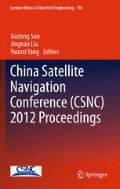Abstract
The service performance of the satellite navigation system has studied in detail in this paper. The accuracy, availability, integrity and continuity of the signal in space and the navigation service are discussed. Their concepts are defined again, which clarify the previous illegibility and make up defects in practice application. The methods to calculate these performance indexes are put forward. The research of the concepts and algorithms can help BeiDou Navigation Satellite System to issue service performance standards based on a unified platform and provide stable, high reliable and quality satellite navigation services for global users.
Access this chapter
Tax calculation will be finalised at checkout
Purchases are for personal use only
References
Chen, J., Zhou, J., & Zhao, W. (2005). Concept analysis of performance requirements in satellite navigation system. Radio Engineering, 35(1), 30–32.
Zhai, W., Zhang, G., & Yong, Sh. (2011, May). Performance analysis of service volume of COMPASS navigation satellite system based on basic constellation. Shanghai, China: CSNC.
Department of Defense of United States of America. (2008). Global positioning system standard positioning service performance standard http://pnt.gov/public/docs/2008/spsps2008.
Kaplan, E. D. (2007). Understanding GPS principles and applications (2nd ed.). Beijing: Publishing House of Electronics Industry.
Xi, X., Wang, W., & Gao, Y. (2003). Fundamentals of near–earth spacecraft orbit. Changsha: National University of Defense Technology Press.
Hofmann-Wellenhof et al. (2009). GNSS—Global Navigation Satellite Systems GPS, GLONASS, Galileo & more. Beijing: Publishing house of Mapping.
Li, G., Li, J., Li, J., & Gui, Q. (2011). Research on RAIM availability algorithm based on circular error probable. Geomatics and Information Science of Wuhan University, 36(4), 461–466.
Liu, J. (2008). GPS satellite navigation locating principle and methods (2nd ed.). Beijing: Science Press.
Cao, Ch. (2010). General knowledge question answering to satellite navigation. Beijing: Publishing House of Electronics Industry.
Li, Y. (2009). Navigation and positioning (2nd ed.). Beijing: National Defense Industry Press.
Li, G., Li, J., Jiao, W., & Gui, Q. (2010). Analysis of PDOP availability of navigation constellation based on satellite intermittence. Geomatics and Information Science of Wuhan University, 35(7), 841–845.
Li, G. (2011). Modeling, calculating and evaluating reliability of Beidou satellite navigation constellation. Zheng zhou: Information Engineering University.
Li, J., & Li, B. (2007, September). Research and design of RAIM usability prediction system of civil aviation. Navigation, 2007, 35–41.
Guo, R., Tang, B., & Chen, L. (2007). RAIM availability and its results analysis under GPS. Hydrographic Survey and Charting, 27(6), 40–44.
Steve, H. (2003). GNSS receiver autonomous integrity monitoring: A separability analysis. ION GPS/GNSS, 1502–1509.
Wen, Y. (2009). Analysis and simulation technology of satellite navigation system. Beijing: China Aerospace Press.
Shank,C., & Lavrakas, J. (1993). GPS Integrity: An MCS perspective. ION GPS-93, 465–474
Song, B. (2008). Design and analysis of system reliability. xi’an: Northwestern Polytechnical University Press.
Acknowledgments
This research was supported jointly by National Science Foundation of China (No. 40974009, No. 41174005), Planned Research Project of Technology of Zhengzhou City, and Funded Project with youth of Annual Meeting of China’s satellite navigation.
Author information
Authors and Affiliations
Corresponding author
Editor information
Editors and Affiliations
Rights and permissions
Copyright information
© 2012 Springer-Verlag GmbH Berlin Heidelberg
About this paper
Cite this paper
Li, G., Li, J., Gui, Q., Han, S. (2012). Research on Concept and Computation of Service Performance of Satellite Navigation System. In: Sun, J., Liu, J., Yang, Y., Fan, S. (eds) China Satellite Navigation Conference (CSNC) 2012 Proceedings. Lecture Notes in Electrical Engineering, vol 159. Springer, Berlin, Heidelberg. https://doi.org/10.1007/978-3-642-29187-6_16
Download citation
DOI: https://doi.org/10.1007/978-3-642-29187-6_16
Published:
Publisher Name: Springer, Berlin, Heidelberg
Print ISBN: 978-3-642-29186-9
Online ISBN: 978-3-642-29187-6
eBook Packages: EngineeringEngineering (R0)

